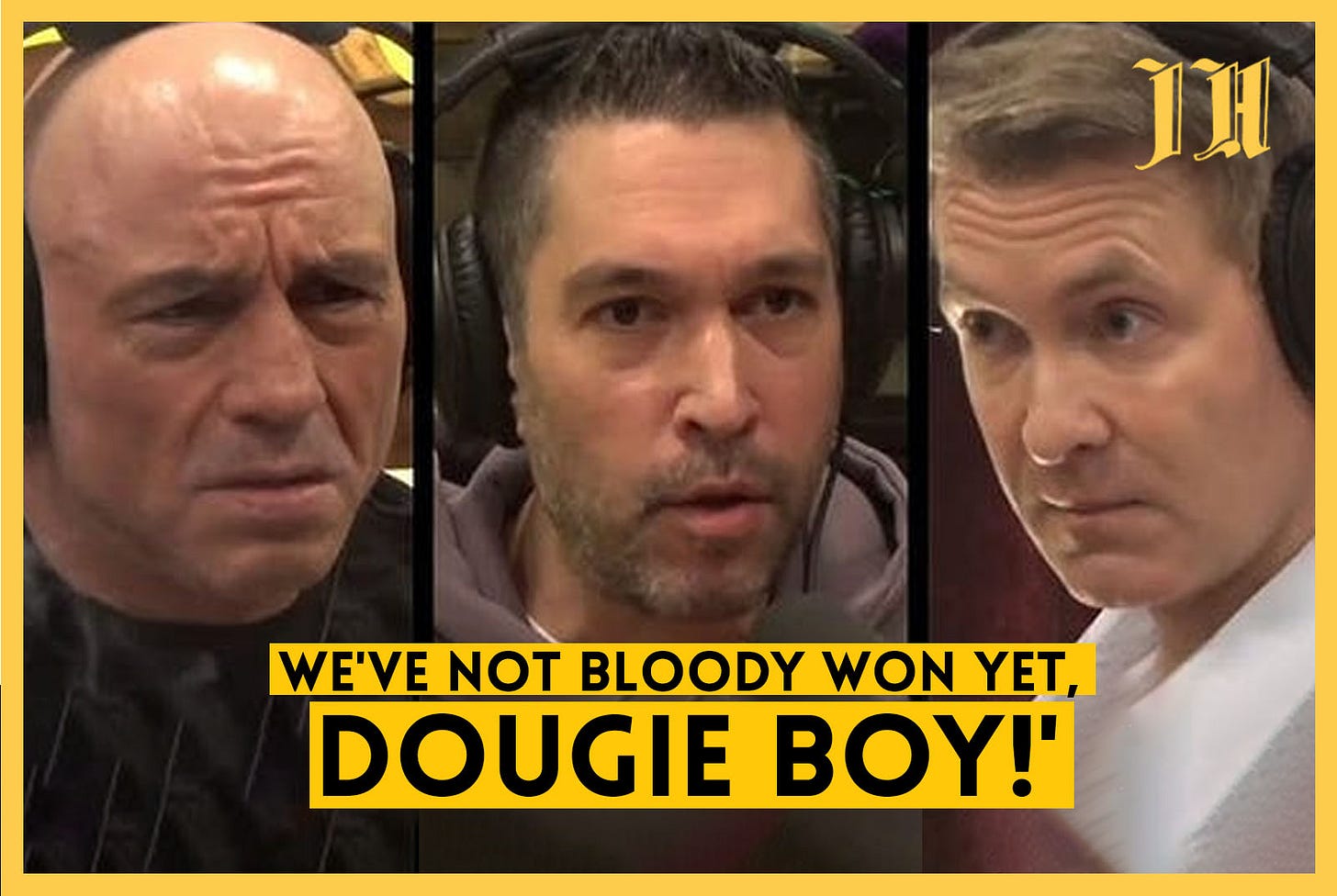Is Douglas Murray Correct that the Right Has Won? NO—We Must NEVER Rest On Our Laurels!
It seems that everybody who is remotely conservative and remotely online is enthralled and infuriated in equal measure by the debate, overtly on the matter of Israel, on The Joe Rogan Experience between the American comedian Dave Smith and the British commentator Douglas Murray. The latter is so pro-Israel that it’s almost as if he’s one of those evangelicals who worships the Jews and goes to Israel to work for free in their vineyards.
Sneering and supercilious as Murray was, he certainly raised some thought-provoking points, even if he has contradicted these elsewhere, raising them as rhetoric in an attempt to win a debate. Do you have to have experienced something personally to seriously discuss it? Should we be more trusting of experts and less trusting of amateurs? Naturally, these questions were cleverly cloaked in linguistic nuance, leaving sufficient material for my friend and live-stream colleague Dr Paul Taylor, who drew my attention to the debate, to be able to defend Murray.
In fact, on our Monday podcast, “Who Won the Debate? Douglas Murray or Dave Smith?”, Murray was clearly, to my surprise, seen as the winner. In an interview with UnHerd about the debate, an interview which took place after our podcast, Murray spent a while summarising exactly the argument Taylor made to me in Murray’s defence. Murray even used exactly the same example that Taylor did: that you wouldn’t take part in MMA fighting unless you were trained in it.
However, in all the fevered discussion of the Smith-Murray debate, the significance of one issue that Murray raised has received relatively little attention. It is an issue that is illustrative of a fundamental problem with conservatives. It is, as far as I can see, a central explanation for why the Right tend to lose power to the Left.
The Left never believe they truly have power, even when they conspicuously do, as is currently the case where they dominate the entire culture, although we may be seeing the beginnings of a right-wing backlash. As such, the Left are Machiavellian. They constantly yearn for power, and their lust for it is never satisfied. The Right seem to believe that they have power even when they don’t. It takes a lot of disempowerment—it takes utter defenestration—for them to understand that they have lost power. In a sense, they are content with life; they just want to grill. This is their problem.
A number of fascinating studies have been published on this issue, but the one that comes to mind is from 2012: “Conservatives Are Happier Than Liberals, but Why? Political Ideology, Personality, and Life Satisfaction” in the Journal of Research in Personality. The paper’s abstract tells us that, “In four studies, conservatives expressed greater personal agency (e.g., personal control, responsibility), more positive outlook (e.g., optimism, self-worth), more transcendent moral beliefs (e.g., greater religiosity, greater moral clarity, less tolerance of transgressions), and a generalised belief in fairness, and these differences accounted for the happiness gap.”
In other words, conservatives feel that they are in control of the world, and liberals—people who are also pessimistic, have low self-esteem, and who see everything as unfair—do not. So, of course, liberals will strive for power. Their Machiavellianism has been highlighted in various studies, such as “The Dark Triad Traits Predict Authoritarian Political Correctness and Alt-Right Attitudes” in the journal Heliyon. The “Dark Triad” refers to the inter-correlated personality disorders of Narcissism, Machiavellianism, and Psychopathy. The far Left score high in Narcissism and Machiavellianism, while the far Right score high in Psychopathy: They enjoy risk and offending people, which is central to being a dissident in a left-wing society.
Douglas Murray implied on The Joe Rogan Experience, and directly stated in a subsequent UnHerd interview, that the Right now have power. The Joe Rogan Experience, and the kinds of right-wing dissidents it platforms, is the “mainstream” now. And now that it is the mainstream, it has a responsibility to society not to uniquely platform dissidents, because this will push society in a “dark” direction where every element of society’s dogmas is questioned, even the idea that the Nazis were responsible for World War II or that six million Jews were exterminated by them in the Holocaust. To quote Murray, “Much of the counter-culture is not the counter-culture anymore, it’s the culture . . . the podcasters have won. Joe probably has more influence on public debate than The Washington Post . . . There comes a point where with great power comes great responsibility.”
It is as though Douglas Murray, himself a dissenter from many aspects of Wokeness, is a Lutheran witnessing the insane excesses of the Radical Reformation—the Münster Rebellion, Anabaptism, and so on—saying, “Steady on! This is going too far! We need to rein it in with a Magisterial Reformation that is better controlled by the elite, by chaps like us!” He may well be right to be fearful in that, when backlashes take place, they will tend to occur in a context of profound discontent and pent-up repressed resentment. Once they commence, people will competitively signal their adherence to it such that it will sweep away many of the “good things,” as some might see it, that took place during the left-wing march. Could we get to a point where homosexuality is reclassified as a mental illness? Where it is recriminalised? It’s possible, and Murray, of course, is as gay as a bicycle.
He realises, correctly, that the anti-Woke march of the right-wing dissident podcasters could trample over him and his niche. Hence, it makes sense to start promoting notions of “authority” and “credentials”—as the credentialed mainstream, concerned about their place in the guild, will tend to put dogma-adherence above truth in a way that outsiders will not—in order to pre-empt a full revolution. And it is possible that this revolution may be as bad, in the other direction, as that which it displaces. Imagine a world in which all those rabid purity-signalling and nationalism-signalling, midwit Twitter-anons are actually in charge: a world of the White Taliban; we would move from the dictatorship of female, blue-haired anthropology graduates who cut themselves because they’re sad, to parents’-basement-dwelling 20-something man-children who still play computer games. Dear God, no!
I don’t want things to go that far—that would be a world in which free speech and free inquiry were as suppressed as they are now—but to grasp freedom back, the backlash must go further than the present. Murray is suggesting that the backlash has happened: the Right are now culturally in charge but, like the radicals of the 1960s, just don’t seem to realise they are. Murray’s is the mistaken attitude of a mainstream conservative who believes he has power even when he doesn’t. He is telling those of us who want to return to a free society that we have won; that we can rest on our laurels. No! We are, possibly, seeing the beginning of a based backlash, but, to quote Murray’s idol Winston Churchill, “Now this is not the end. It is not even the beginning of the end. But it is, perhaps, the end of the beginning.”
For more based-science analysis of society and politics, become a subscriber at JollyHeretic.com!
Did you miss the last Dutton’s Digest? Click below:






> It’s possible, and Murray, of course, is as gay as a bicycle
This is the relevant throughline with Murray. It's what he genuinely cares about, and all his various writings and seemingly contradictory stances only make sense in reference to it.
He wrote Strange Death of Europe (still a brilliant and, at the time, daring book), but he doesn't seem to have anything much to say about e.g. the Jewish enclaves of north London or the question of whether Rishi Sunak is English. He feverishly defends Israel and seems more concerned with the misfortunes of the peoples of Israel than of his own homeland. He was stridently anti-trans. He takes grave exception to the president of Turkey and with the behaviour of many Arab states.
At first one can confuse oneself when reading Murray, especially if one's introduction is via Strange Death, into thinking that he's primarily a nativist, or further right than he really is. In truth, he's just anti-Muslim, and for good reason: they're anti-him. He took issue with trans because it turns the public against LGBT. He took issue with mass immigration in the Merkel era because it filled Europe with gay-hating Muslims. He supports Israel because they too hate and seek to destroy Muslims.
This is the only throughline that makes sense with this man. It's what he truly cares about. That's not to say he _doesn't_ care about e.g. liberalism, but it's not his primary cause.
Murray cannot be trusted, if you can't see that get to Specsavers.